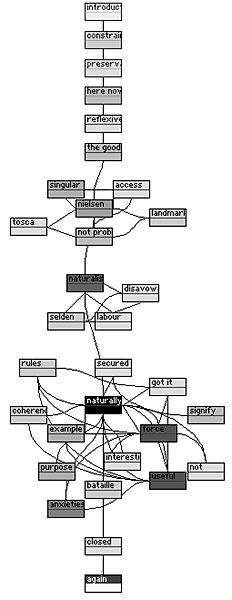
|
As semiotics has laboriously detailed, the relation of signifier to signified in language is arbitrary and so the particular signs that any culture chooses as significant are essentially social in nature. As social artefacts the signs in language are subject to the anomalies and prejudices of any social system, with the caveat that as a major system of signification language bears an extreme burden of authority and power in articulating and maintaining a status quo.
Within literature a dominant narrative form, the realist novel, has developed. Within this form various codes (series of semiotic events) are utilised to make the work appear as a natural or even neutral artefact. That is, its nature as a constructed, made, and uttered (written) object is concealed by various artifices of illusion. This might include such things as the presence of narrative closure, diegetic integrity, the use of formulaic genres, and the illusionism of an absent writer, all of which contribute to the quality of textual wholeness or completeness for such a work.
For a theorist such as Barthes (and for many cultural commentators since) such illusion is revealed to be a particular strategy of the text (conscious or unconscious hardly matters) to conceal various ideological systems contemporaneous to the text. Barthes' suggests that an assumption that language in itself is a transparent container for intention and meaning obscures any discourse as being first of all a "work" - with "work" having the connotations of labour, struggle, and objectness.
While such theoretical activity has been instrumental in various forms of ideological close analysis (for instance in the work of feminist, Marxist and postcolonial scholars), it is the recognition that realism is primarily defined by such critics as a narrative system whose general style is to disavow or conceal its own systems of production that is important for this essay. Such a disavowal may take the form of naturalising narrative by relying on 'common sense' ideas of psychological cause (people in stories fall in, or out of, love), or the concealing of the status of the work as an artificial construct, or even more simply in rendering its particular conventions in a manner that renders them opaque to readerly attention.
|